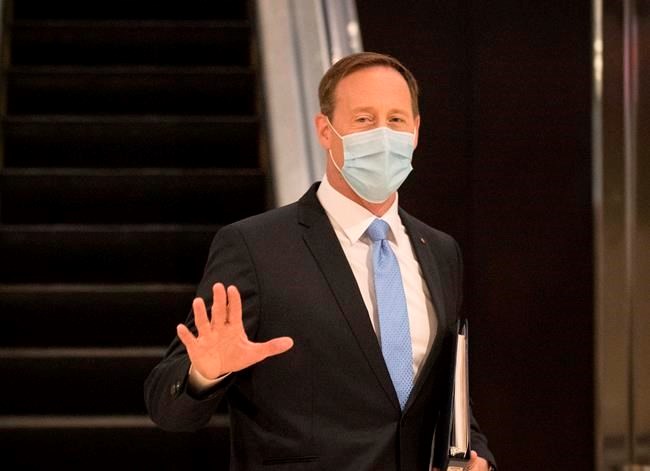OTTAWA — Conservative leadership candidate Peter MacKay is taking heat for skipping a pair of virtual debates organized by grassroots party members.
Riding associations in both the Greater Toronto Area and British Columbia banded together to organize their own events for all four candidates to present themselves to party members.
Leslyn Lewis, Erin O'Toole and Derek Sloan all attended the Toronto debate and are expected at Wednesday's B.C. event.
MacKay committed to attend the GTA one in principle, but then had a conflict with the June 24 date so didn't join.
He turned down the invite to the B.C. event on Wednesday, a decision that the debate co-chair said "bummed" him out.
The COVID-19 pandemic has meant few opportunities for would-be voters to compare the candidates side by side, said Angelo Isidorou, who said he's not made up his mind who he'll vote for in the contest.
Though this event will be virtual — as was the one in Toronto — they are better than nothing, he said.
"Each candidate has released videos and stuff like that but it's different when they are in a room together, even if it is a virtual room," he said.
Isidorou said the organizers worked to get the backing of all 42 area riding associations for the event to ensure candidates would feel it was worth their time. They also offered to be flexible on the date. So far, they have 2,500 people registered to watch.
When asked late last week why MacKay wasn't attending Wednesday's event, his campaign said he is focusing on communicating directly with party members and getting out the vote.
"Any given provincial town hall he does gets thousands of individual contacts," spokesman Chisholm Pothier said in an email.
On Tuesday Mackay's campaign claimed a scheduling conflict and promoted a town hall he was holding that evening with B.C. supporters.
The only debates leadership contenders had to attend were two set up by the leadership organizing committee.
Those were in mid-June and all four candidates were there.
The party itself was forced to make it clear that the B.C. debate wasn't a mandatory event sanctioned by the leadership organizing committee, known as LEOC, after receiving numerous complaints.
In a letter to party members, a copy of which was obtained by The Canadian Press, the party said it appreciated the initiative shown in B.C., but couldn't speak to how it was put together.
"This is not an official LEOC debate and therefore we're unable to answer your questions surrounding it. It also means the LEOC rules around debates do not apply."
The June 24 event was staged by the Etobicoke-Lakeshore, Etobicoke Centre and Parkdale-High-Park riding associations.
In a statement posted to the Etobicoke-Lakeshore riding association's Facebook page, organizers said 100 people watched candidates field specific regional questions including one on traffic congestion and another on how they would tackle homelessness.
A similar approach is being taken to Wednesday's B.C. event.
During the 2019 election campaign too many Conservatives were asked local questions at voters' doors the party had no answer for, said Isidorou.
The point of Wednesday's event is to make sure the candidates do have answers now, and they've been given the questions in advance.
The subjects include outreach to the East Asian community, what their approaches would be on money laundering and the future of the logging industry.
The way the party elects a leader also makes regional events important, said Isidorou.
The Conservatives use a point system. Each riding in Canada is allocated 100 points, and candidates are awarded the points based on their share of the votes.
What that means is a riding with four party members is just as influential as a riding with 400.
B.C.'s Lower Mainland is dotted with associations with small memberships, Isidorou said, and he has observed candidates taking pains to directly woo the few but mighty.
He lives in Vancouver Centre, a riding Liberals have held since 1993.
But the leadership candidates need support from Conservatives there as much as they do in traditional strongholds, he said.
That means they must have positions on more than just bread-and-butter issues, which can then be useful come the next general election.
"I'm in the belly of the beast in Vancouver Centre, but that's the vote you have to win over at some point," said Isidorou.
"You can't just (say), 'Oh tell me more about how much you love guns.' We get it. What else?"
Ballots are going in the mail in the coming days for the race and must be returned by Aug. 21. A winner is expected to be announced the following week.
This report by The Canadian Press was first published July 8, 2020.
Stephanie Levitz, The Canadian Press



